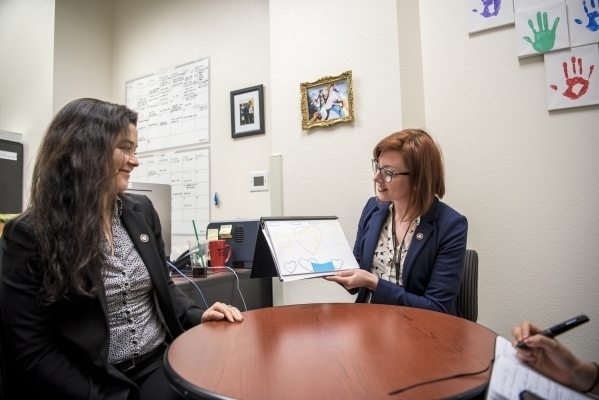UNLV working to boost legal aid resources for undocumented children
Attorneys Katelyn Leese and Alissa Cooley operate on a shoestring budget, and until recently, the future of their legal battles — affecting the lives of nearly 100 children — seemed uncertain.
But their bosses at UNLV have vowed to boost resources for their overburdened legal aid program, which is designed to help undocumented children seeking deportation relief. Administrators plan to hire a third lawyer and offer a much-needed pay hike to Leese and Cooley, whose struggles to keep up with a ballooning caseload were spotlighted in a Review-Journal story nearly six months ago.
“I will make it a priority going forward to raise funds to support it,” said Daniel Hamilton, dean of the Boyd School of Law at UNLV. He noted that a portion of a recent $750,000 donation from the families of Nevada bankers E. Perry Thomas and Jerome Mack will bolster the program’s coffers. “There’s more to come,” he said.
A STRONGER PROGRAM
Hamilton’s promise could affect the future of hundreds of undocumented children who make the long, perilous trek from Central America to Las Vegas. Many of those children turn to UNLV’s Thomas & Mack Legal Clinic, where Leese and Cooley have fought since 2014 to keep them in Nevada through a service sponsored by the federal AmeriCorps community aid program.
The AmeriCorps initiative for unaccompanied minors is funded with money from the Justice Department. Officials there said that after receiving its first round of funding of $2 million two years ago, organizers enlisted 75 AmeriCorps members nationwide who helped nearly 1,100 children during the program’s first six months.
Demand in Las Vegas has been overwhelmingly high, and the program pays Leese and Cooley only about $24,000 per year for grueling work that often spills into nights and weekends.
Hamilton said the school is working to renew its AmeriCorps contract for at least another year, and it is also pursuing other revenue sources to give them both pay raises because they are “certainly not making a sufficient wage.”
He also hopes that bringing a new attorney to the clinic will make their caseload more manageable: Since the program launched, they have taken on cases for 98 children in immigration-related proceedings. UNLV officials said at least 28 have been spared from deportation — eight of those children have been granted permanent residency in the United States.
Eventually, Hamilton also hopes the clinic will add to its caseload after turning away new clients this year because Leese and Cooley were stretched too thin.
“Effective representation in any immigration context, especially with respect to refugee children, is complex, intensive, and demanding of institutional and personal resources. These children deserve no less,” Leese said in an email this week. “I look forward to the university’s financial commitment to delivering children with the diligent, zealous representation they deserve.”
A NATIONAL CRISIS
Nationwide, tens of thousands of children from Central America have flocked to the U.S. since the late 2000s, flooding shelters and added to a backlog of more than 375,000 immigration court cases nationwide. Many are fleeing from brutal, pervasive gang violence — in recent years, Honduras, El Salvador and Guatemala have topped the world’s murder rate lists.
“If they stay they will die,” said Angela Morrison, a law professor at Texas A&M University and former legal director of the Nevada Immigrant Rights Project. “A lot of parents are desperate to get their children out of those countries. People are just trying to get out.”
President Barack Obama has called the surge a humanitarian crisis. In 2009, U.S. Border Patrol agents detained about 3,300 unaccompanied children from Honduras, El Salvador and Guatemala. That number ballooned to about 52,000 in 2014, dipped to 28,000 last year and spiked again early this year.
A December study published in the University of Pennsylvania Law Review examined over 1.2 million deportation cases decided between 2006 and 2012 and found that children often attended immigration court alone: over the six-year period studied, only 55 percent of children had legal counsel.
“There’s a real lack of representation,” said Ingrid Eagly, a law professor at UCLA who co-authored the study. “Immigration law is incredibly complex, so for someone who is an immigrant who is fleeing violence to understand that process and articulate claims is difficult — for a child, it’s virtually impossible.”
The UNLV program aims to fill that gap. Although two other nonprofit groups in the Las Vegas Valley also offer legal assistance to the minors, resources are scarce and demand is high. Leese and Cooley share the load with attorneys at the Legal Aid Center of Southern Nevada and Catholic Charities of Southern Nevada, but no other group takes as many complicated and time-consuming cases as the UNLV clinic.
Michael Kagan, who supervises the attorneys as director of UNLV’s legal clinic, praised the duo and the university’s pledge to strengthen the program.
“Katelyn and Alissa are two of the most energetic attorneys I’ve worked with here or anywhere. I hope they stick around a long time,” Kagan said. “I think they deserve a medal for starting this program from nothing.”
Contact Ana Ley at aley@reviewjournal.com or 702-224-5512. Find her on Twitter @la__ley.

















